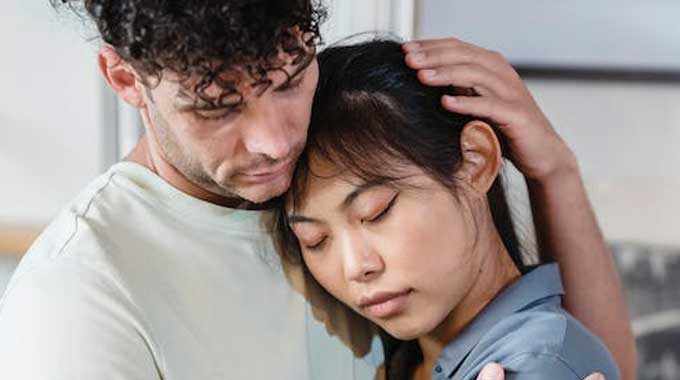Many people experience bouts of depression throughout their lives. It can have a major impact on someone’s quality of life, especially if left untreated, but how does depression affect relationships?
What Is Depression?
When we discuss depression, we often use it as an umbrella term for several different mood disorders. Being depressed is more than just feeling sad. Major depressive disorder is a serious condition characterized by prolonged periods of low mood. These periods last for at least two weeks and also involve unusually low self-esteem and a loss of interest in or desire for things that used to bring enjoyment.
Major depressive disorder is believed to be brought on by a combination of factors. These range from environmental pressures, psychological characteristics, as well as biological or genetic factors. It is commonly held that some preexisting vulnerability or predisposition is triggered by a stressful life event.
The core features of the condition are long periods of low mood and a lack of motivation or hope. However, there is more than one kind of depression and it is not uncommon for people to suffer from multiple conditions at once. This is called comorbid depression, and it can make a precise diagnosis more tricky.
Bipolar Depression
Bipolar depression is a mood disorder with many similarities to major depressive disorder (MDD). Where it differs most is in the changing between two distinct phases. A person with bipolar disorder will experience the same periods of low mood as someone with MDD, followed by a period of heightened energy and mood.
In this way, bipolar appears from the outside to be much more like extreme mood swings, and the person can go from feeling very high to very low and back again over a period of weeks. These periods of high energy are called mania, which is why this used to be called manic-depression.
Psychological Symptoms of Depression
Aside from feeling depressed, what are some of the other signs and symptoms of depression? MDD can often leave sufferers feeling like they are worthless. Low self-esteem can affect anyone, but the kind of emotions someone with MDD might experience are usually more extreme.
A sense of hopelessness often comes with clinical depression, and many people report feeling helpless to change their lives or affect the things around them. Alongside this, people may be frequently tearful without clear causes and feel sad for long periods of time.
Other symptoms of a depressive episode include:
- feelings of anxiety or worry
- a strong sense of guilt, very often misplaced
- being more easily annoyed than normal and less patient with people
- indecisiveness
- a loss or lack of motivation
- no longer taking pleasure in things that used to be fun or enjoyable
- difficulty concentrating
There is also a serious risk of suicidal thoughts and self-harm. One study published in the National Library of Health noted that 48% of participants who reported depression also said they had life-long suicidal ideation. If you are worried that there is an immediate danger of self-harm, please speak to someone, be it friends, family, a doctor, or another mental health provider.
Physical Symptoms
A person may also experience physical symptoms as a result of depression. Many people report a general and long-lasting fatigue, or a profound lack of energy. This is sometimes accompanied by slowness of movement and unexplained aches and pains.
As well as lethargy and pain, many people often experience insomnia or other disruptions to their sleep cycles. A lack of sleep can exacerbate many of the psychological symptoms too. Some women also experience changes to their menstrual cycles.
Depression and Relationships
Being in a loving relationship can bring a lot of comfort to someone who is depressed. A healthy relationship can provide stability, but there is sometimes a risk that someone’s depression may present as a problem. There are many ways in which one person’s mental health can impact relationships. Partners tend to worry about each other’s well-being, and if one can see that the other is experiencing depressive symptoms then they will often try to ‘fix’ the problem.
Having the support that comes with loving relationships can be a major aid in coping with the symptoms, but it can also add more pressure. Someone with MDD or bipolar depression might feel guilty that they don’t always want to spend time with their partner, even if they are happy in the relationship. Similarly, the partner may also blame themselves for the other’s mental health, and feel responsible for not making them happy.
This guilt and blame are especially hard, as major depression cannot always just be fixed by the actions of a loved one, even if it feels that way. Seeing that you are affecting your partner without meaning to is also hard, and relationship problems can arise even when both partners are trying to be understanding.

Depression and Conflict
Someone struggling with depression may be at times irritable with a family member or loved one. This can lead to conflict and argument. A sudden change in your partner’s mood or motivation might cause friction or for partners to feel ignored or discarded. Inversely, someone with depression might resent that their partner is taking the behavior personally, and see it as selfish or inconsiderate.
Arguments can come about quickly in any relationship, but the way depression affects someone’s mood and behavior can lead to some negative emotions on both sides.
Someone with bipolar disorder may also behave in more erratic and unpredictable ways during periods of mania. The consequences of their actions may be very different from what they intended and may present an opposing picture of how they really feel.
Conflict is not always a result of depression, but can also be a factor affecting its onset. Research published in the National Library of Medicine looked into the link between intimate partner violence and depression in women. The study found that women who experienced violence from a partner were more likely across the board to develop symptoms of depression. This was especially the case for those who had been victims of sexual violence.
How to Help Avoid Conflict in Relationships
It is important to talk about these feelings and make sure that everyone involved has the opportunity to speak openly. It can help partners to be able to recognize the signs of behaviors that are a result of the depression, rather than being due to the partner or relationship.
This goes both ways, and sometimes it can help to give your partner the heads up that you feel a depressive episode coming up, or that there are warning signs of a manic period coming so that they can prepare themselves. This enables both partners to support each other but also to help compartmentalize some of the negative feelings that can come about.
Being able to speak with family or friends about relationship problems can also help. Having a third party to whom you can perhaps give more detail too without fear of there being any repercussions or unintended reactions can help put things into perspective.
Depression and Physical Intimacy
Many people who suffer from poor mental health, especially those with depressive symptoms, report that it has a significant impact on their sexual desire. Even in healthy relationships, people go through phases where their sex life is less active. But those who experience depression often report that they experience a notable reduction in their sex drive.
This can be difficult for their partner and can result in anxiety about the relationship. Lots of adults find it hard to discuss their sex life, and having a medical condition that affects your mood can make this even harder.
Furthermore, some antidepressants or selective serotonin reuptake inhibitors (SSRIs), which may form part of treatment for depression, can also impact someone’s sex drive. As always, it is vital to talk openly and honestly about this. Giving your loved one support with their depression is good for the overall health of the relationship, even if there are moments of difficulty.
Seeking Treatment for Depression
Fortunately, there are plenty of treatment options available. GIA Miami offers a wide range of treatment options, tailored to your needs. Part of the process for getting a diagnosis involves a kind of questionnaire called a diagnostic survey. During this process, a doctor or other mental health professional from our team will go through a series of questions to find out key information. This will include any family history of mood disorders.
Treatment options
Once a diagnosis has been made, one of our trained healthcare professionals will help draw up a research-based program tailored to your individual needs, as well as the local resources available.
Here at GIA Miami, we offer a wide range of counseling or therapy options, to help someone who is depressed manage their condition and improve the health of their relationship.
Couple’s therapy is another option that helps repair and support relationships where one or both people are depressed. This type of relationship counseling can also act as a sign that someone is taking concrete steps toward recovery and help reduce any stress the relationship may be under.
Treatment may involve the use of drugs such as antidepressants and SSRIs. Our state-of-the-art facilities mean we can even offer transcranial magnetic stimulation (TMS) therapy, a noninvasive treatment that can help complement a bespoke treatment program.
Get in contact with GIA Miami today to learn more about how we can help you, and your relationship, overcome depression.







